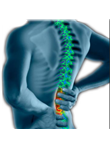|
|
|
Pain and reward: How the affective--motivational system is perturbed in chronic pain
|
|
|
|
|
|
|
|
|
|

|
|
|
Anna M.W. Taylor
|
|
|
|
University of California, Los Angeles.
|
Semel Institute for Neuroscience and Human Behavior, University of California, Los Angeles, California, USA.
|
|
ataylor1@ucla.edu
|
|
|
|
|
|
|
|
|
|

|
Chronic pain is a debilitating, persistent disease that remains poorly managed in many patients. Part of the problem of current analgesics is their focus on reducing the sensory discriminative element of pain, but pain has an equally important aspect relating to the affective quality, or how much the pain 'bothers' you. Drugs that target both the sensory and affective elements of pain, such as opioids, are generally more effective analgesics. However, opioids have inherent rewarding properties, in addition to their pain relieving qualities, which complicate the interaction between analgesia and pain affect. Further, despite their outstanding analgesic efficacy in acute pain settings, opioids are less effective in relieving chronic pain. While the exact mechanisms of why this may be remain debated, alterations in the limbic system resulting from a chronic pain state is a logical possibility. In this review,.....
|
|
|
|
|
|
|
|

|
|